#holy prince peter of murom
Text
Saints&Reading: Sunday, September 17, 2023
september 4_september 17
TRANSLATION OF THE RELICS OF PRINCE PETER AND PRINCESS FEBRONIA ( TONSURED DAVID AND EUPHROSYNE) WONDERWORKERS OF MURON (1228)

Holy Prince Peter (David in monasticism) and Holy Princess Febronia (Euphrosyne - Euphrosynē - in monasticism), Wonderworkers of Murom. Prince Peter was the second son of the Murom prince Yuri Vladimirovich. He entered upon the throne of Murom in the year 1203. Several years before this Saint Peter had fallen ill with leprosy, from which no one was able to heal him. In a vision it was revealed to the prince that the daughter of a bee-keeper would be able to heal him: the pious maiden Febronia, a peasant of Laskova village in Ryazan gubernia. Saint Peter sent his emissaries to this village.
When the prince saw Saint Febronia, he fell in love with her because of her piety, wisdom and virtue, and vowed to marry her after being healed. Saint Febronia healed the prince and became his wife. The holy couple loved each other through all their ordeals. The haughty boyars did not wish to have a princess of common origin, and they urged that the prince leave her. Saint Peter refused, and so they banished the couple. They sailed off on a boat from their native city along the River Oka, and Saint Febronia continued to console Saint Peter. Soon the wrath of God fell upon the city of Murom, and the people begged the prince return together with Saint Febronia.
The holy couple was famous for their piety and charity. They died on the same day and hour, June 25, 1228, having received the monastic tonsure with the names David and Evphrosyne. The bodies of the saints were put in the same grave.
Sts Peter and Febronia showed themselves exemplary models of Christian marriage, and are considered as the patron saints of newly-weds.
THE HOLY MARTYR HERMIONIA (117)
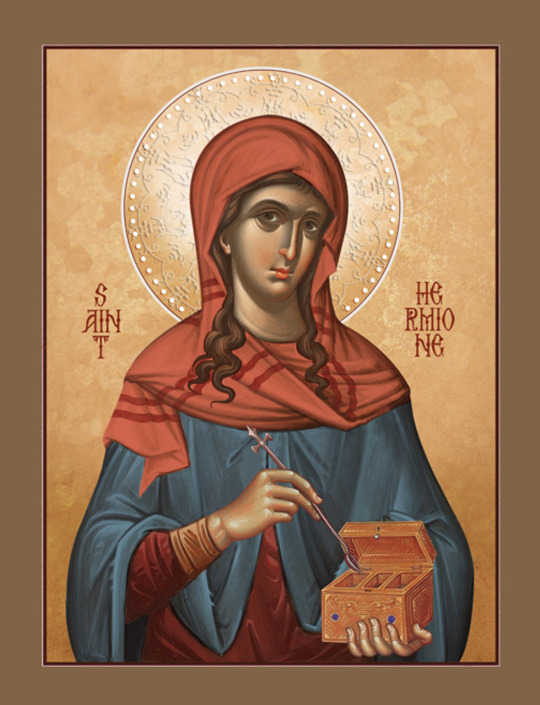
The Holy Virgin Martyr Hermione (Ἑρμιόνη) was one of the four daughters of Saint Philip the Deacon (October 11). She had the gift of prophecy (Acts 21:8), and devoted herself to apostolic labors.
Desiring to see the Holy Apostle John the Theologian, Hermione and her sister Eutykhida traveled to Ephesus in search of the Saint. While on their journey, they learned that he had reposed. Continuing on, the sisters met a disciple of Saint Paul, whose name was Petronius, and emulating him in all things, they became his disciples. Saint Hermione mastered the healing arts, rendering assistance to many Christians, and healing the sick by the power of Christ.
At that time, Emperor Trajan (98-117) was waging war against the Persians. When he heard of Saint Hermione's prophetic gift, he stopped at Ephesus in order to have her predict what his future would be. She told him that he would defeat the Persians, and that his son-in-law Hadrian would succeed him as the Emperor of Rome. Then Trajan discovered that Hermione was a Christian, and at first he tried to persuade her to renounce Christ with gentle admonitions. When this did not succeed, he commanded that she should be struck in the face for several hours, but she endured this suffering with patience. Moreover, she was comforted by a vision of the Lord, Who appeared in the form of Petronius, and sitting upon the Judgment Seat.
Convinced that Hermione would continue steadfast in her faith, Trajan released her. Later she built a hospice where she cared for the sick, treating their physical and spiritual infirmities.
Trajan’s successor, Hadrian, also demanded that the Saint be brought to trial for professing the Christian Faith. At first, the Emperor ordered that she be beaten mercilessly, then the soles of her feet were pierced with nails; and finally they threw her into a cauldron filled with boiling tar, lead, and sulphurous brimstone. The Saint bore all this without complaint, giving thanks to God.
The Lord was merciful and the fire was extinguished, the lead poured out, and Saint Hermione remained unharmed. Astonished, Hadrian went to the place of torture and touched the cauldron to ascertain whether it had cooled. When he touched the cauldron, he burned the skin of his hand, but even this did not dissuade the Emperor.
Then Hadrian ordered that she be thrown naked into a large red-hot copper vessel. Her Guardian Angel protected her and put out the fire, which burned those standing around her. The Saint stood in the vessel, as if on dewy grass, singing hymns of praise to the Lord.
When she was removed from the vessel, the Holy Martyr pretended that she was ready to sacrifice to the pagan "god" Hercules. The delighted Emperor had her taken to the temple, but when she prayed to the only true God, a loud thunderclap was heard, and all the idols in the pagan temple fell down and shattered.
In a rage, Trajan ordered that Saint Hermione be led out of the city and executed. Two servants, Theódoulos and Theótimos, were commanded to carry out his orders. Because they were in such a hurry to execute the Saint, they did not allow her time to pray, and their hands were withered. Then they believed in Jesus Christ, and falling at Saint Hermione's feet in repentance, they entreated her to pray that the Lord would heal them and call them to Himself before her martyrdom. By her prayers, that is what transpired. Afterward, she was beheaded and was buried at Ephesus.
Source: Orthodox Church in America_OCA
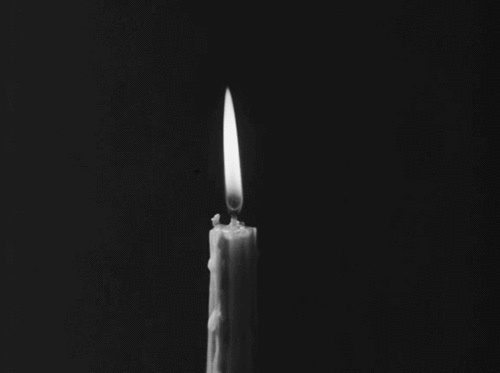

HEBREWS 11:33-12:2
33 who through faith subdued kingdoms, worked righteousness, obtained promises, stopped the mouths of lions, 34 quenched the violence of fire, escaped the edge of the sword, out of weakness were made strong, became valiant in battle, turned to flight the armies of the aliens. 35 Women received their dead raised to life again. Others were tortured, not accepting deliverance, that they might obtain a better resurrection. 36 Still others had trial of mockings and scourgings, yes, and of chains and imprisonment. 37 They were stoned, they were sawn in two, were tempted, were slain with the sword. They wandered about in sheepskins and goatskins, being destitute, afflicted, tormented- 38 of whom the world was not worthy. They wandered in deserts and mountains, in dens and caves of the earth. 39 And all these, having obtained a good testimony through faith, did not receive the promise, 40 God having provided something better for us, that they should not be made perfect apart from us.
1 Therefore, since we are surrounded by so great a cloud of witnesses, let us lay aside every weight. The sin which so easily ensnares us, and let us run with endurance the race that is set before us, 2 looking unto Jesus, the author and finisher of our faith, who for the joy that was set before Him endured the cross, despising the shame, and has sat down at the right hand of the throne of God.
LUKE 24:1-12
1 Now on the first day of the week, very early in the morning, they, and certain other women with them, came to the tomb bringing the spices which they had prepared. 2 But they found the stone rolled away from the tomb. 3 Then they went in and did not find the body of the Lord Jesus. 4 And it happened, as they were greatly perplexed about this, that behold, two men stood by them in shining garments. 5 Then, as they were afraid and bowed their faces to the earth, they said to them, "Why do you seek the living among the dead? 6 He is not here, but is risen! Remember how He spoke to you when He was still in Galilee, 7 saying, 'The Son of Man must be delivered into the hands of sinful men, and be crucified, and the third day rise again.' 8 And they remembered His words. 9 Then they returned from the tomb and told all these things to the eleven and to all the rest. 10 It was Mary Magdalene, Joanna, Mary the mother of James, and the other women with them, who told these things to the apostles. 11 And their words seemed to them like idle tales, and they did not believe them. 12 But Peter arose and ran to the tomb; and stooping down, he saw the linen cloths lying by themselves; and he departed, marveling to himself at what had happened.
#orthodoxy#orthodoxchristianity#easternorthodoxchurch#originofchristianity#spirituality#holyscriptures#bible#gospel#wisdom#saints
1 note
·
View note
Photo
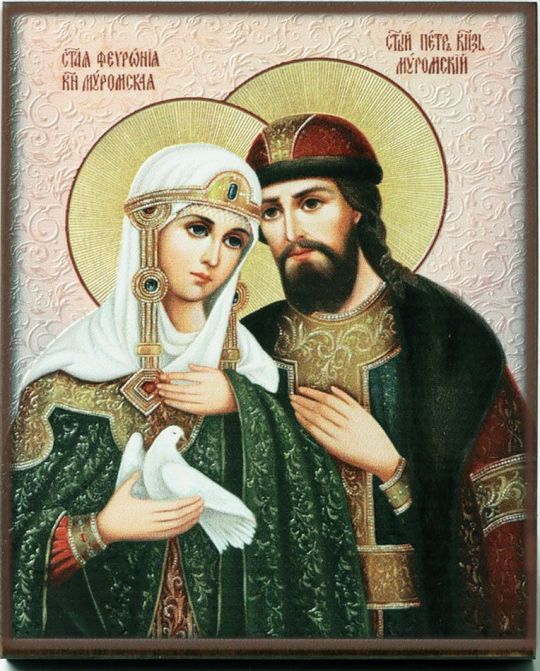
Holy Prince Saint Peter and Holy Princess Saint Febronia, Wonderworkers of Murom
You were like a pious root from a precious branch, O blessed Peter, you lived admirably in piety, and with your wife, the divinely-wise Febronia, you have pleased God in the world, and were compared to the venerable monks. With them, entreat the Lord to preserve your country unharmed, so that we may always honor you.
#saints#icon#saint peter of murom#saint febronia of murom#holy prince peter of murom#holy princess febronia of murom#icons#saint
12 notes
·
View notes
Photo

16th-century Russian icon of the Tale of Peter and Fevronia of Murom from the Murom History and Art Museum. The icon depicts scenes from the life of the Holy Prince Peter and Princess Fevronia, wonderworkers and patron saints of the land of Murom. Peter and Fevronia were spouses and the brightest personalities of Holy Rus, whose lives reflected its spiritual values and ideals. The saints are now considered the patrons of marriage and family.
#icon#Russian icon#iconography#Christianity#orthodoxy#Orthodox Church#saints#saint#art collection#art museum#russian art
11 notes
·
View notes
Text
Saints&Reading: Sat., Sept. 12, 2020
Commemorated on August 30, November 23_Old Julian Calendar
The Holy NobleBorn Prince Alexander Nevsky( 1263)
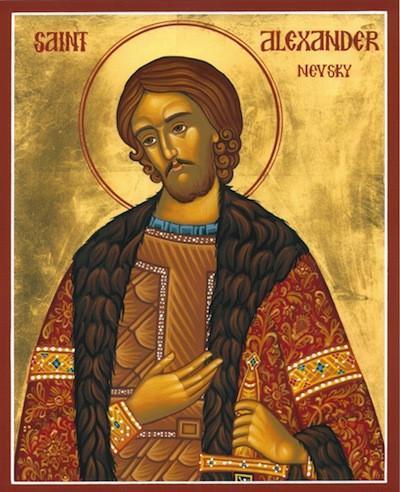
The Holy NobleBorn Prince Alexander Nevsky (in monastic-schema Alexei) died on the return journey from the Horde at Gorodtsa on the Volga, on 14 November 1263, and on 23 November (under this day is located the account about him) in 1263 he was buried in the Cathedral Church of the Nativity Monastery in the city of Vladimir (there is set up there now a memorial to the holy prince; yet another memorial is set up in the city of Pereslavl'-Zalessk). Veneration of the nobleborn prince started right at his burial, whereof was a remarkable miracle: the saint himself extended his hand for the absolving prayer. Great Prince Ioann Ioannovich (1353-1359) in his spiritual testament written in the year 1356, left to his son Dimitrii (1363-1389), the future victor of the Battle of Kulikovo, "an icon of Saint Alexander". The undecayed relics of the nobleborn prince were opened, on account of a vision, before the Kulikovo Battle – in the year 1380, and then were set forth for local feast-celebration. For the prayers of the holy prince, glorified by defense of the Fatherland, Russian commanders resorted to in all the following times. On 30 August 1721 Peter I, after a lengthy and exhausting war with the Swedes, concluded the Nishtad Peace. This day was decided upon to hallow by the transfer of the relics of the NobleBorn Prince Alexander Nevsky from Vladimir to the new northern capital, Peterburg, arranged on the banks of the Neva. Withdrawn from Vladimir on 11 August 1723, the holy relics were greeted at Shlissel'burg on 20 September of that year and remained there until 1724, when on 30 August they were placed in the Trinity Cathedral of the Alexander Nevsky Lavra (Monastery), where now also they rest. By an edict/ukaz on 2 September 1724 there was established a feastday on 30 August (in 1727 the feast was discontinued by reason of non-church matters, and involved clique-struggles at the imperial court. In 1730 the feast was again re-established).
Archimandrite Gavriel Buzhinsky (later Bishop of Riazan, + 27 April 1731) compiled a special service in remembrance of the Nishtad Peace, combining with it a service to Saint Alexander Nevsky.
The name of the Defender of the borders of Russia and the Patron of Soldiers is famous far from the regions of our Native Land. The testimony to this: the numerous temples dedicated to Saint Alexander Nevsky. The most famous of them: the Patriarchal Cathedral at Sofia, the Cathedral church in Talinin, and a church in Tbilisi. These churches are a pledge of friendship of the Russian National-Liberator with brother nations.
© 1996-2001 by translator Fr. S. Janos.
NobleBorn Prince Daniel of Moscow (1652)
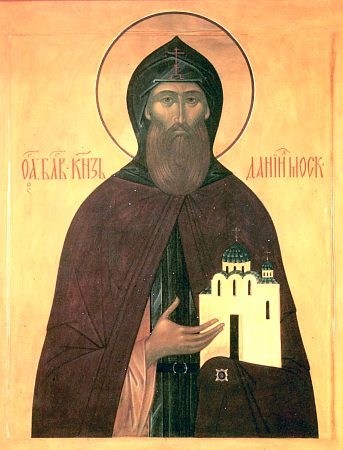
Holy Nobleborn Prince Daniel (Daniil) of Moscow was born at Vladimir in the year 1261. He was the fourth son of Saint Alexander Nevsky (Comm. 30 August and 23 November) and Righteous Vassa. Two years after birth he lost his father. The date of his mother's repose is not indicated in the chronicles; it is known only, that she was buried in the church in honour of the Nativity of Christ at the Vladimir Uspenie monastery (the Princess monastery), and the people in the surroundings venerated her as "Righteous" ("Pravedna").
In 1272 holy Prince Daniel received as his allotted portion the city of Moscow with its adjacent lands. The holy prince built on the banks of the River Moskva (Moscow) a church (and alongside it a monastery) in honour of his same-name patron saint, the Monk Daniel the Pillar-Dweller (Comm. 11 December). The Moscow principality was during this period small and unobtrusive. While growing up, holy Prince Daniel strengthened and expanded it, not in manners unjust or coercive, but instead benevolent and peace-loving. In Rus' it was a time of unrest. Fratricidal strife amongst the appanage princes was rife. And often, thanks to holy Prince Daniel, and his incessant striving for unity and peace in the Russian Land, bloodshed was averted. In 1293 his brother, the Great-prince Alexander Alexandrovich, together with Tatars summoned from the Horde and headed by Diuden ("the Diudenev Host"), laid waste to Russian cities: Murom, Suzdal', Kolomna, Dmitrov, Mozhaisk, Tver'. Prince Daniel decided to adjoin them to Moscow, to save their people from perishing. There was not the strength for resistance. Together with his people, the prince braced himself for terrible destruction and pillaging. Standing up for his rights, Saint Daniel was compelled to come out against his brother near a place, called Yur'evo Tolchische ("Yur'evo Threshing-Mill"), but here also the yearning for peace won out in him, and bloodshed was averted.
In 1300, when the Ryazan prince Konstantin Romanovich, having summoned Tatars to his aid, was occupied in secret preparations for a sudden assault on the lands of the Moscow principality, Prince Daniel went with an army to Ryazan, and beating the enemy, he took captive Konstantin and destroyed a multitude of Tatars. This was a first victory over the Tatars, though not a tremendous victory, but it was noteworthy nonetheless – as a first push towards freedom. Having beaten the Ryazan prince and scattered his confederates the Tatars, holy Prince Daniel did not take advantage of his victory to seize foreign lands or take booty, as was the accepted custom during these times, but rather he displayed an example of true non-covetousness, love and fraternity. The holy prince never resorted to arms to seize the lands of others, nor did he ever snatch away the property of other princes either by force or by treachery. And for this the Lord saw fit to expand the boundaries of his princely realm. Ioann Dimitrievich, prince of Pereslavl'-Zalessk, a nephew of Daniel, was gentle and pious and benevolent towards the poor, and he esteemed and loved his uncle; dying childless in 1302, he bequeathed his principality to Saint Daniel. The Pereslavlsk lands together with Dmitrov were, after Rostov, foremost in number of inhabitants, with corresponding fortification befitting a major city. Pereslavl'-Zalessk was well protected on all sides. But the holy prince remained faithful to Moscow and did not transfer the capital of his princedom to the stronger and more significant seat of the Pereslavl' of this period. This annexation moved Moscow up to be numbered as the most significant principality. And here was set in place the principle of the unification of the Russian Land into a single powerful realm.
How wondrous over the expanse of ages was clearly manifest the Providential Will of God concerning the Russian Land and its destiny!
Grateful in remembrance of the constant Blessing of the Hodegetria ("Way-Guide Mother of God) both in his personal life, and also in the life of the Russian realm, Saint Daniel's father – Saint Alexander Nevsky, had expressed it in the words: "God is not in might, but in right!".
In 1303 Saint Daniel fell seriously ill. He assumed the monastic great-schema and commanded that he be buried at the Danilov monastery. Through deep humility he wanted to be buried not within the church, but in the common monastery cemetery. The holy prince died on 4 March.
Within the passage of less than 30 years after the repose of holy Prince Daniel, the Danilov monastery founded by him was transformed into the Moscow Kremlin, the church was transformed into a parish church, and the cemetery became non-monastic. During the time of Great-prince Ivan III (1462-1505), the Monk-prince Daniel gave reminders of himself to his forgetful descendents. As a stranger he appeared to a youth attendant on the great-prince and said: "Be not afraid of me – I was a Christian and the master of this place, my name is Daniel Prince of Moscow, and by the will of God I am here. Tell about me to Great-prince Ioann (Ivan) saying: thou delightest thyself while yet having forgotten me, but God hath not forgotten me". And after this it was that the great-prince established the singing of cathedral panikhidas for his ancestral princes. During the time tsar Ivan the Terrible, at the grave of Saint Daniel was healed the dying son of a barge merchant. The tsar, struck by the miracle, renovated the ancient Danilov monastery and established a yearly church procession, made by the metropolitan to the place of burial of the holy prince, serving there a panikhida.
In 1652 holy Monk-prince Daniel was glorified with the uncovering of his incorrupt relics, which on 30 August were transferred to the church in honour of the Holy Fathers of the Seventh OEcumenical Council.
The holy relics were placed in a reliquary "to the glorifying of the Holy Trinity and for the healing of the infirm". The Moscow metropolitan Platon (+ 1812), in the Vita of the holy prince compiled by him, writes: "This original founder laid the foundation of present-day majestic Moscow, going about this with quiet steps upon a small foot-path. And thus as with any edifice, built not with extreme haste but the rather instead with great artifice and skill, doth receive a particular solidity and doth stand indestructible for a long time; and just as a tall tree growing for many a century, and having started first of all with a small sprout, and thickeneth little by little, with its branches spreading about far around, so also was it needful for this city to grow from the small, but solid root, in order that its first glimmer not beshadow the eyes of the envious, and that initially it not be disturbed or felled early on, but rather grow up to its true height. Thus did this founder prepare the great city given him; though small, but shining uninterrupted by any wafting of the wind, he did bequeathe the great glory of its rise to his son Great-prince Ioann (Ivan) Danilovich, called Kalita".
© 1996-2001 by translator Fr. S. Janos.
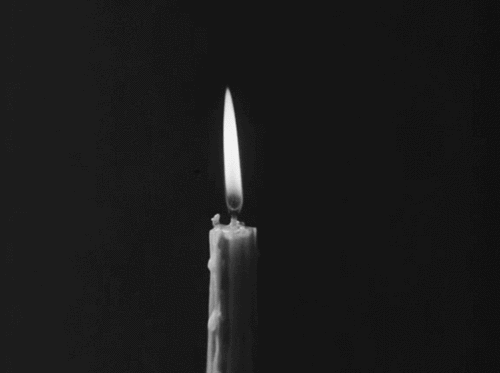

Matthew 23:1-12
1Then Jesus spoke to the multitudes and to His disciples,2saying: "The scribes and the Pharisees sit in Moses' seat.3Therefore whatever they tell you to observe, that observe and do, but do not do according to their works; for they say, and do not do.4For they bind heavy burdens, hard to bear, and lay them on men's shoulders; but they themselves will not move them with one of their fingers.5But all their works they do to be seen by men. They make their phylacteries broad and enlarge the borders of their garments.6They love the best places at feasts, the best seats in the synagogues,7greetings in the marketplaces, and to be called by men, 'Rabbi, Rabbi.'8But you, do not be called 'Rabbi'; for One is your Teacher, the Christ, and you are all brethren.9Do not call anyone on earth your father; for One is your Father, He who is in heaven.10And do not be called teachers; for One is your Teacher, the Christ.11But he who is greatest among you shall be your servant.12And whoever exalts himself will be humbled, and he who humbles himself will be exalted.
Galatians 5:22-6:2 (St. Alexander Nevsky)
22But the fruit of the Spirit is love, joy, peace, longsuffering, kindness, goodness, faithfulness,23gentleness, self-control. Against such there is no law.24And those who are Christ's have crucified the flesh with its passions and desires.25If we live in the Spirit, let us also walk in the Spirit.26Let us not become conceited, provoking one another, envying one another.
1Brethren, if a man is overtaken in any trespass, you who are spiritual restore such a one in a spirit of gentleness, considering yourself lest you also be tempted.2Bear one another's burdens, and so fulfill the law of Christ.
4 notes
·
View notes